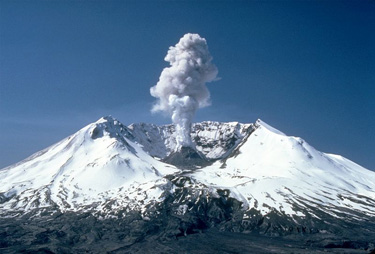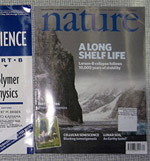Rapidly mobilizing ecological research after natural disasters
 Research
Research  Plume of smoke rising from Mount Saint Helens. Credit Lyn Topinka, USGS.As a volcanic eruption in Iceland sets off havoc accross Europe, scientists around the world are certainly preparing to descend on the area (once they can get their proposals and funding in order).
Plume of smoke rising from Mount Saint Helens. Credit Lyn Topinka, USGS.As a volcanic eruption in Iceland sets off havoc accross Europe, scientists around the world are certainly preparing to descend on the area (once they can get their proposals and funding in order).
When Mount Saint Helens erupted in 1980 transforming the landscape, the event set off a flurry of scientific activity that continues to this day. This research has led to major ecological discoveries including how biological legacies influence ecosystem recovery.
Unexpected natural disturbances like forest fires, tsunamis, and volcanoes can provide unparalleled research opportunities for gaining resource management and ecological insights.
Yet these research opportunities also create a formidable challenge. Natural disturbances generally occur without much warning.
Gaining scientific insight from these unexpected events often requires initiating studies soon after the disturbance occurs. But coming up with research ideas and obtaining funding can take months if not years.
This is causing us to a squander precious opportunities for advancing ecology and conservation, David Lindenmayer and fellow researchers argue in a new article in the journal Frontiers in Ecology and the Environment.
To address this issue, they propose some new approaches to enable quick mobilization of research after natural disturbances.
Specifically the authors outline 3 key steps for improving the response:
1) Develop funding mechanisms specifically for rapid research response - Right now very few funding mechanisms exist solely for this purpose.
This funding should be set-up well ahead of time. In the case of natural disasters, once the event occurs, available funding will likely be focused on dealing with huamanitarian needs.
The process for securing funding should be streamlined to allow for the quick awarding of money.
2) Conduct planning ahead of time - Scientists should plan for future research opportunities - for example by creating generic proposals that anticipate future study ideas. This will allow researchers to respond quickly after natural disturbance creates an opportunity.
3) Create infrastructure for rapid response research - This includes making resources available specifically for this purpose - for example, equipment and logistic support that can be mobilized quickly.
by Rob Goldstein
Lindenmayer, D., Likens, G., & Franklin, J. (2010). Rapid responses to facilitate ecological discoveries from major disturbances Frontiers in Ecology and the Environment DOI: 10.1890/090184




Reader Comments